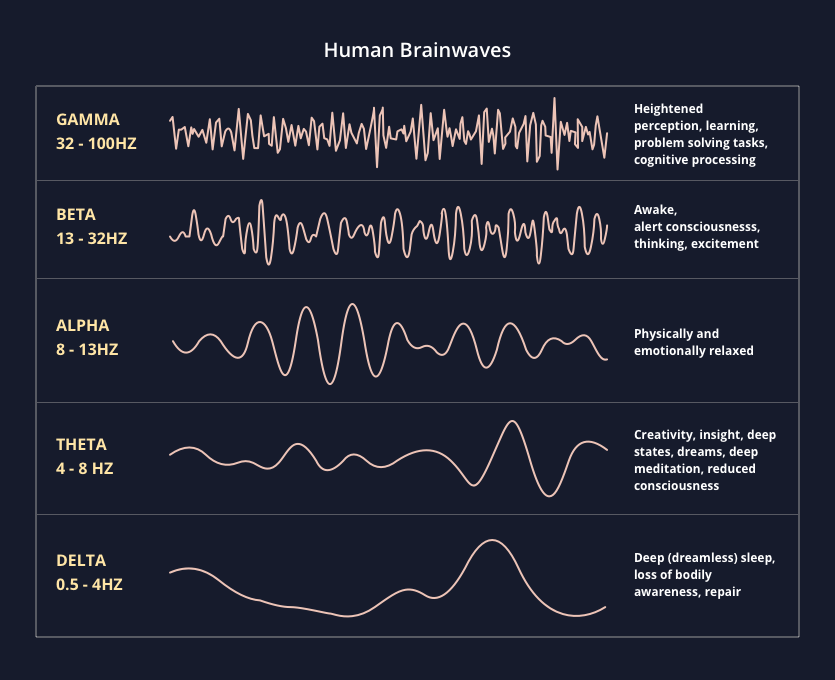What are Delta Waves?
A Regenerative Brainwave that Characterizes Deep Sleep
By Dr. Dan Gartenberg
Last Updated: March 30, 2023
Overview of Delta Waves
Our brain waves in deep sleep have these long-burst brain waves that are very different from our waking life brain waves - called delta waves. Deep sleep measurement occurs using electrodes attached to the skull. When we don’t get the deep sleep we need, it inhibits our ability to learn and for our cells and bodies to recover. Sleep is how we convert all those interactions that we make during the day into our long-term memory and personalities. As we get older, we’re more likely to lose these regenerative delta waves. So in sense, deep sleep and delta waves are actually a marker for biological youth. Watch Dr. Dan Gartenberg's TED talk on the brain benefits of deep sleep.
Types of brainwaves

European sleep docs define 4 stages of sleep: N1, N2, N3, N4, and REM, while Americans combine N3 and N4. This points to the fact that these stages are in some respects defined in arbitrary ways (essentially N3 and N4 sleep are defined by a percentage of delta brainwaves. These brainwaves occur at the 0.5 - 4Hz range, characterized by having long wavelengths. They are thought to be essential for clearing out metabolic waste that forms in the brain throughout the day, which explains the link between delta waves and Alzheimer's disease and related dementia. Specifically, deep sleep promotes the glymphatic cleansing system in the brain that clears out destructive amyloid plaques. In REM sleep, our brainwaves are similar to what they are like in waking life when we experience Beta brainwaves, but our bodies are completely paralyzed (except for our eyes). This is to ensure that we do not hurt ourselves while we are dreaming. REM sleep is essential to integrating shorter-term memories into your personality and long-term memory store. Both REM and deep sleep are essential to healthy sleep (you want more REM and you want more deep). But also remember, even light sleep is regenerative to your body, and brief delta waves can also occur in this stage of sleep.
How Sleep Stages Change with Age

Above is a 2004 population health study that shows how brainwaves change with age. Notice that as we get older, we generally sleep less. However, this does not mean that you need less sleep as you get older, it may be a bi-product of your body breaking down. It is likely healthy to maintain at least 7 hours of sleep a night for all adults. Oftentimes, chronic stress occurs with age which results in less sleep and a weaker circadian rhythm. As a result, there is typically a marked decrease in deep sleep brainwaves, which is thought to play a causal role in the conversion to dementia. This is what we study with our collaborators at Penn State. Theoretically, by increasing delta brainwaves as we get older, we can mitigate the conversion to mild cognitive impairments and Alzheimer's disease.
How Much Deep Sleep Do I Need?
At SleepSpace, we have run peer-reviewed studies showing that sound can be used to increase these regenerative brain waves by replicating the same burst frequency as your brain waves when your brain is in deep sleep. That sound pattern actually primes your mind to have more of these regenerative delta waves. When we asked participants the next day about the sounds, they were completely unaware that we played the sounds, yet their brains responded with more of these delta waves.
If you are getting more than 1.5 hours of deep sleep and REM a night, I'd consider this very healthy. If you are getting that much deep sleep and you are above 50 years of age, we would consider this extremely healthy. But remember, don't focus too much on what your wearable tells you. While it provides great relative truth, it can get the sleep stages a bit wrong for some people. Electrodes are the gold standard for measuring sleep stages and wearables can only provide approximations that are about 80% accurate. Ways of improving deep sleep include sleeping in a dark, quiet, and cool room, exercise, elevating body temperature during the day, and using our adaptive sound machine to entrain deeper brainwaves.
Dr. Dan Gartenberg's TED Talk about entraining delta waves using the science of sound
Since this TED Talk in 2018, we implemented the Deep Sleep Stimulation using the science of sound within SleepSpace. SleepSpace is one of the only apps that measures sleep during sleep. Every 30-seconds the software detects what stage of sleep you are in. When your are very likely to be in a deep sleep stage, we play the delta wave frequency in order to prime this regenerative brainwave. The deep sleep stimulation is more accurately and can play the delta wave sound more precisely when you also use our patented SleepSpace Smart Bed and Phone Charger.
